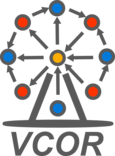Unsere Forschungsvision: (english version below)
Entwicklung von smarten Methoden für komplexe Probleme in Produktionsplanung und –steuerung und im Supply Chain Management
Die logistischen Herausforderungen in den Supply Chains werden durch steigende Variantenvielfalt und steigende Anzahl an individualisierten Produkten und somit kleineren Produktionslosen (Lotsize 1) immer komplexer und dadurch auch störungsanfälliger. Derzeit werden sehr viele Entscheidungen (insbesondere bei Störungen/disruptions) von Disponentinnen/Planerinnen getroffen. Die Qualität der Entscheidungen hängt von der Kompetenz und der Erfahrung der Planerin ab. Entscheidungsunterstützungssysteme werden kaum bzw. nur teilweise in Einsatz gebracht, da die Qualität dieser kommerziellen Systeme sehr häufig nicht an die Lösungsgüte von Expertinnen herankommt. Neben dem steigenden Bedarf an individualisierten Produkten (Products for Needs) nimmt die notwendige Ressourcenschonung und Nachhaltigkeit einen immer höheren Stellenwert ein. Energieeffiziente Produktion und emissionsreduzierte Distribution sind neben den ausschließlich kostenorientierten Zielen aktuelle Planungs- und Steuerungsthemen. Dabei werden auch immer mehr die Wartung, gegebenenfalls technische Services und Entsorgung von Produkten in den Planungsprozess integriert (Reverse Logistics).
Durch neue Technologien, wie das Internet der Dinge (IoT) und die cyberphysischen Systeme (CPS) wird die Vernetzung von Fertigungsmaschinen und –robotern möglich, d.h. diese Maschinen können Informationen sammeln, aufzeichnen und autonom austauschen. Dabei fallen durch die Fortschritte in Sensorik und Aktorik auch zusätzliche neue große Datenmengen über aktuelle Zustände im Produktions- und Logistiksystem an. Planungssysteme in Produktion und Supply Chain Management könnten immer mehr steuernde Tätigkeiten besser und schneller erledigen, aufgrund der Fülle von Daten die durch die neuen Technologien gesammelt und vernetzt werden.
Die steigende Komplexität und somit auch höhere Störungsanfälligkeit auf der einen Seite und die steigende Verfügbarkeit von Sensordaten auf der anderen Seite erfordern neue Planungs- und Steuerungsmethoden. Die technologischen Möglichkeiten sind zunehmend vorhanden aber smarte Planungsmethoden und Lösungsverfahren für flexible, komplexe Planungsprobleme fehlen.
In der Arbeitsgruppe Produktion und Logistik mit Internationaler Schwerpunktsetzung (POMinternational) gibt es Erfahrung in der Entwicklung von intelligenten Planungsmethoden unter Verwendung von Operations Research (OR) Techniken. Insbesondere im Bereich der Metaheuristiken (genetic algorithm, ant colony optimization, variable neighborhood search) und der Matheuristiken (solution pool generation based set covering/set partitioning heuristics, fix & optimize and local branching heuristics) kann die Arbeitsgruppe auf einen breiten Erfahrungsschatz zurückschauen. Die existierenden Methoden können durch die neuen technologischen Möglichkeiten (IoT, CPS, sensor based environments) grundlegend erweitert und redesigned werden, damit sie die verfügbaren Informationen aus Echtzeitdaten in die Planungs- und Optimierungsalgorithmen integrieren, autonom reagieren und entscheiden können. Für diese dezentralen autonomen und intelligenten Planungsmethoden werden Konzepte der künstlichen Intelligenz (autonome multiagent systems, machine learning) mit Meta- und Matheuristiken verzahnt.
Die derzeit bearbeiteten Anwendungsgebiete reichen von klassischen Problemen in Produktion und Logistik (vehicle routing, scheduling, lot sizing) zu integrierten kombinierten Problemen (production routing, scheduling routing, inventory routing). Der Lehrstuhl arbeitet unter anderem mit Anwendungsproblemen im Intermodalen Transport, in der City Logistik, im Öffentlichen Verkehr, im Sicherheitsrouting, in der Stahlindustrie, in der Produktion von verderblichen Gütern und im Gesundheitssektor.
Our research vision:
We want to develop smart methods for complex problems in production planning & control as well as in Supply Chain Management.
The challenges in logistics getting more and more complex and vulnerable for disruptions since the lot sizes in production are getting smaller and smaller thru a growing number of product variants and the triumph of product personalization (lots size 1). Up to now the most decisions in supply chains (at least in the case of distributions) were made by schedulers. The decision quality depends on their experience, level of knowledge, and the information available. Decision support systems are barely used in practice. One of the main reasons is the solution quality, the most systems are not able to beat or reach the solutions of experienced schedulers. In addition to the level of product individualization the significance for sustainability and resource preservation are also growing. The reduction of emissions in distribution and energy efficiency in production are beside cost reductions important topics in planning and control. The after sales service in terms of repair and disposal of products getting integrated into the planning process (reverse logistics).
New Technologies like the Internet of Things (ioT) and cyber physical systems (CPS) support the interaction of production machines and robots, i.e. those machines autonomously collect, record, and exchange information and data. Advances in sensor technology and actuating technology result in huge amounts of additional data describing the state of the production and logistical systems in any moment in time. Planning systems will improve their ability to advance their efficiency in terms of quality and speed based on those new technologies and their ability to handle and learn from this huge amounts of data.
New planning and control systems were needed to deal with the higher complexity and the involved vulnerability to distributions on the one hand and the increasing amount of data on the other hand. Smart planning and solution methods for those flexible and complex planning problems were needed to take advantage of those new technological opportunities.
The working group for Production and Logistics with International Focus (POMint) has a high level of expertise for the development of intelligent planning methods based on techniques used in Operations Research (OR). Especially Metaheuristics and Matheuristics were part of our portfolio. Those methods could be redesigned and advanced in such a manner that they integrate the real-time data from those new technologies (IoT, CPS, sensor based enviroments, etc.) to autonomously react and control the system. For those decentralized autonomous and intelligent planning systems concepts from the field of artificial intelligence and Operations Research (Meta- and Matheuristics) have to interact.
Currently the members of the working group deal with a wide range of problems in production & logistics (vehicle routing, scheduling, lot sizing, etc.) as well as with integrated and combined problems (production routing, scheduling routing, inventory routing, etc.). The department deals with applications in intermodal transportation, inner-city logistics, public transportation, security routing, steel industry, with perishable goods and in the field of health care.
Faculty of Business, Economics and Statistics
University of Vienna
Oskar-Morgenstern-Platz 1
A-1090 Vienna
T: +43-1-4277-379 52
F: +43-1-4277-837952






